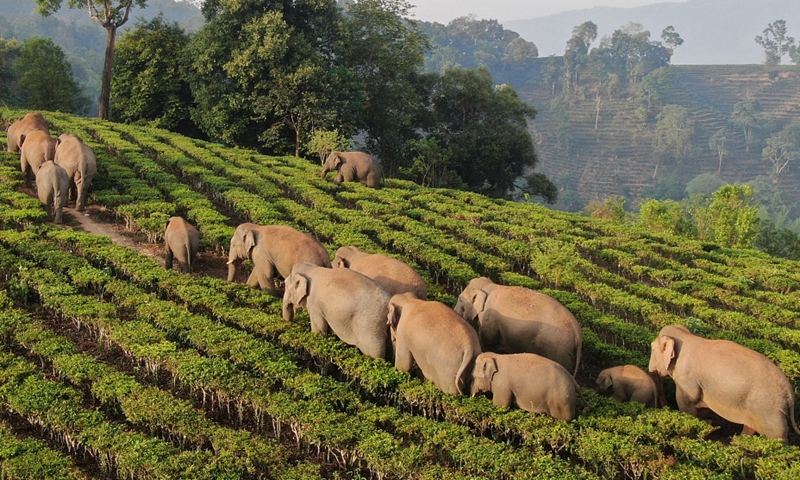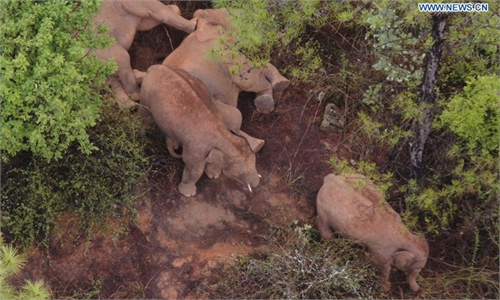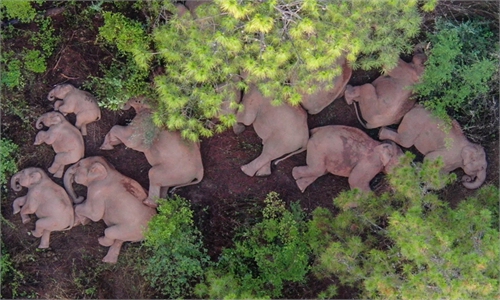
Cute elephant herd! Turning on faucet and drinking water by turns, snoozing in the fields, the migrating parade of wild Asian elephants wandering for 15 months in Southwest China's Yunnan Province has become new internet celebrities.Photo:VCG
A herd of stray wild Asian elephants in Southwest China's Yunnan Province has been away from its home for two months, with its current direction of travel showing no intention of returning. As Yunnan enters the rainy season, the elephants' return will almost certainly be delayed as well. The local government is making every effort to guide them to a suitable new habitat, and compensating local villagers for the economic losses suffered in the "elephant exodus."
As the herd has moved too far from its original habitat, and Yunnan has entered the rainy season making it difficult to cross rivers, it is extremely unlikely that the herd will return to its original habitat at any time soon, Zhang Li, a field wildlife biologist and professor on mammal conservation at Beijing Normal University, told the Global Times.
"The best solution is to find a new and more suitable habitat for the herd and guide them there, away from crowds, to reduce the possibility of human-elephant conflict," Zhang said.
Experts also pointed out that if the elephant herd eventually returns to its original habitat in Xishuangbanna, it will be in winter at the earliest.
Yunnan is trying to use rainfall, cooling weather and other favorable conditions, in addition to food, to guide the elephants.
Although the herd has not caused any casualties, it has done a lot of economic damage. In Yuxi alone, the elephants caused damage to more than 400 households, mainly to economic crops such as bananas and corn.
All damage and compensation is being determined, and the government will give residents full compensation for any damage caused by the elephants, local officials said on Sunday.
"The public liability insurance for wildlife accidents covers the whole province of Yunnan. Citizens do not need to buy it separately," Xiang Ruwu, an official of the Yunnan Forestry and Grassland Bureau, said.
Previously, there was speculation that wild elephants were leaving their habitat because the local ecology had been damaged, but some experts pointed out that the migration of elephants northward instead proved that Yunnan's ecology has progressed in recent years.
"The range of Asian elephants in China has expanded from two prefectures and three counties in the 1990s to three prefectures and 12 counties by the end of 2020, which also indicates that the areas suitable for Asian elephants are increasing," Chen Fei, director of Asian Elephant Research Center, State Forestry and Grassland Administration of China wrote in a column on Monday.
Researches show that wild animals undertake long-distance migration depending on the connectivity of the landscape and environmental conditions. The Asian elephants were able to reach Kunming unimpeded because of the restored forests and farmland along the way, Chen noted.
Starting from their original habitat, the Xishuangbanna National Nature Reserve in Yunnan's southernmost prefecture, on April 16, the elephants have wandered more than 600 kilometers northward. It's the furthest that a herd of wild elephants from Xishuangbanna has ever travelled from its habitat.
The herd started with 16 members, with two leaving the group and heading back, and a new one born on the journey. One elephant had previously left the herd and was currently about 16 kilometers from the group.


